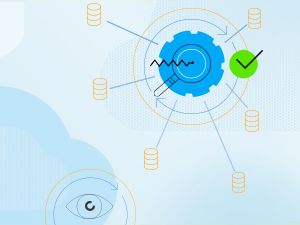The Key Benefits of CI/CD - Continuous Integration and Delivery

Learn about the ways Progress Professional Services deploys CI/CD to help OpenEdge customers and how they can benefit your organization.
Ask any software or application developer to describe what it’s like to deliver software changes and updates to legacy platforms. Their answers will be “overly complex,” “too labor-intensive" or something along those lines. Often, those legacy platforms go without any substantial updates either because they are just not supported anymore or for the reasons mentioned above.
It is a difficult job, no doubt. In many instances, it’s completely unrealistic for a company to replace their legacy platforms with something brand new. Eventually, a company must develop a new methodology or look for outside resources.
For your organization to thrive and to compete in an ever-changing and agile technology environment, developers should utilize continuous integration and continuous delivery (CI/CD). Releases must be delivered quickly in weeks, days or as needed with mature and well-organized DevOps strategies.
CI/CD is part of DevOps, the collection of philosophies, practices, teams and tools designed to significantly improve an organization’s pace of delivering scalable applications and services. Developing best practices with DevOps helps ensure efficiencies and extensibility as software platforms expect to support microservices architecture, containers and cloud technologies.
And not only do CI/CD workflows help your software development team complete tasks and projects more efficiently, but your customers will benefit too.
But First, What is CI/CD?
Continuous Integration (CI) is a software engineering methodology where development team members frequently integrate their various projects through automation. A software team using CI usually relies on automation tooling, which empowers teams to build, test and merge code seamlessly and without hassle.
On the other end of the development spectrum is continuous delivery (CD). Continuous delivery is when software is always ready to be deployed. While using an automation tool, continuous delivery involves slowly releasing code in increments. This methodology is safer than releasing all the code and updates simultaneously so that any problems can be detected earlier in the process.
Alternatively, CD can stand for continuous deployment, often called “push button” deployment. Continuous deployment enables development teams to place new software releases into production, using automation and a scheduled time. Continuous deployment can also be used on-demand, if the developers require it. It should be noted that continuous deployment is only available once a fully-baked DevOps practice has been implemented.
Whether CD stands for continuous delivery or deployment, the process goes hand in hand with CI. When integrating the two processes, developers create a repeatable workflow within the pipeline where one task flows into the next. The concept of iterating, testing and validating is important in that it offers an opportunity to provide feedback during critical points and undo specific tasks when failures occur.
CI/CD pipelines generally start with the source code and track the journey through the commit, build and test phases, eventually moving to the production environment. Every CI/CD pipeline starts with smaller phases, the first phase being continuous integration and the second one being continuous development or deployment.
What Are the Benefits of a CI/CD Pipeline?
Now that we have the definitions, perhaps you’re curious to know how these methodologies can help your organization:
- Building and using automation ensures efficiency, speeds up build cycles and fewer humans need to be involved.
- Automation enables faster feedback loops in cases of code defects—identification of defects and logging results in quicker resolution.
- Quality dashboards provide complete visibility and a complete view into built results. Using automated static Code Analysis rules, software such as SonarQube can help validate coding standards, best practices, security vulnerabilities and performance pitfalls.
- Confidence in code quality and repeatable processes enables faster release cycles.
- Developers can focus on their work and spend less energy on the CI process.
- Combining test automation and other CI benefits allows for more development focus, resulting in better quality.
- The resulting builds can be auto-deployed to the target server as desired through a CI server.
Overall, your development team will thank you. However, suppose you are looking to start implementing your CI/CD practices but require additional skills or extra time. Progress Professional Services has been working with Progress OpenEdge application developers for decades.
How the OpenEdge DevOps Framework Helps with CI/CD Integration
A business application will undergo many cycles of incremental changes throughout its lifespan, including code changes, compilation, builds and validation. These cycles repeat multiple times before a publicly available release is made available. The OpenEdge DevOps Framework is designed to help implement an efficient CI pipeline that handles compilation, repository integration, testing and packaging for ABL applications. It also provides the convenience of sharing the CI pipeline configuration between the development and production build processes.
The OpenEdge DevOps Framework comprises a set of plugins designed to address the requirements of two types of users:
1. Users who are new to the CI process and want a simple way to set up their pipeline.
2. Advanced DevOps engineers with a complex CI process and additional flexibility needs.
The framework provides the convenience of sharing the CI pipeline configuration between the development and production build processes.
How Progress Professional Services Assists with Your CI/CD
Simply put: It is paramount for DevOps teams to create and develop scalable CI/CD practices and strategies involving continuous and reliable delivery and deployment. A repeatable and scalable delivery methodology is the backbone that makes fast and reliable software delivery possible.
The software delivery model in legacy platforms tends to be overly complex and requires many developers' attention. The separation of IT from development and monolithic, on-premises ecosystems dictate that software releases are done infrequently and at significant risk. If that describes your organization, you must build a CI/CD process that includes integrated tooling, services, data and procedures to enable your engineers to plan, build, test, release and manage your software delivery practice.
Progress Professional Services is here to help you make that journey.
To learn more about OpenEdge and the benefits of its CI/CD capabilities, watch our webinar from Progress Professional Service members and product experts, Christopher Longo and Chad Thomson. If you’re ready to talk with an expert about how to implement a CI/CD pipeline into your OpenEdge development process, reach out to us today.

Colin Barry
Copywriter Colin Barry has spent the majority of his career in the tech sector of Boston as a journalist and content marketer, writing about early-stage startups and consumer electronics. However, it is the combination of marketing and creative writing that draws him to the world of copywriting. Colin lives in Massachusetts and is self-described film geek, rock music nerd, and video game enthusiast.
Next:
Comments
Topics
- Application Development
- Mobility
- Digital Experience
- Company and Community
- Data Platform
- Security and Compliance
- Infrastructure Management
Sitefinity Training and Certification Now Available.
Let our experts teach you how to use Sitefinity's best-in-class features to deliver compelling digital experiences.
Learn MoreMore From Progress
Latest Stories
in Your Inbox
Subscribe to get all the news, info and tutorials you need to build better business apps and sites
Progress collects the Personal Information set out in our Privacy Policy and the Supplemental Privacy notice for residents of California and other US States and uses it for the purposes stated in that policy.
You can also ask us not to share your Personal Information to third parties here: Do Not Sell or Share My Info
We see that you have already chosen to receive marketing materials from us. If you wish to change this at any time you may do so by clicking here.
Thank you for your continued interest in Progress. Based on either your previous activity on our websites or our ongoing relationship, we will keep you updated on our products, solutions, services, company news and events. If you decide that you want to be removed from our mailing lists at any time, you can change your contact preferences by clicking here.


